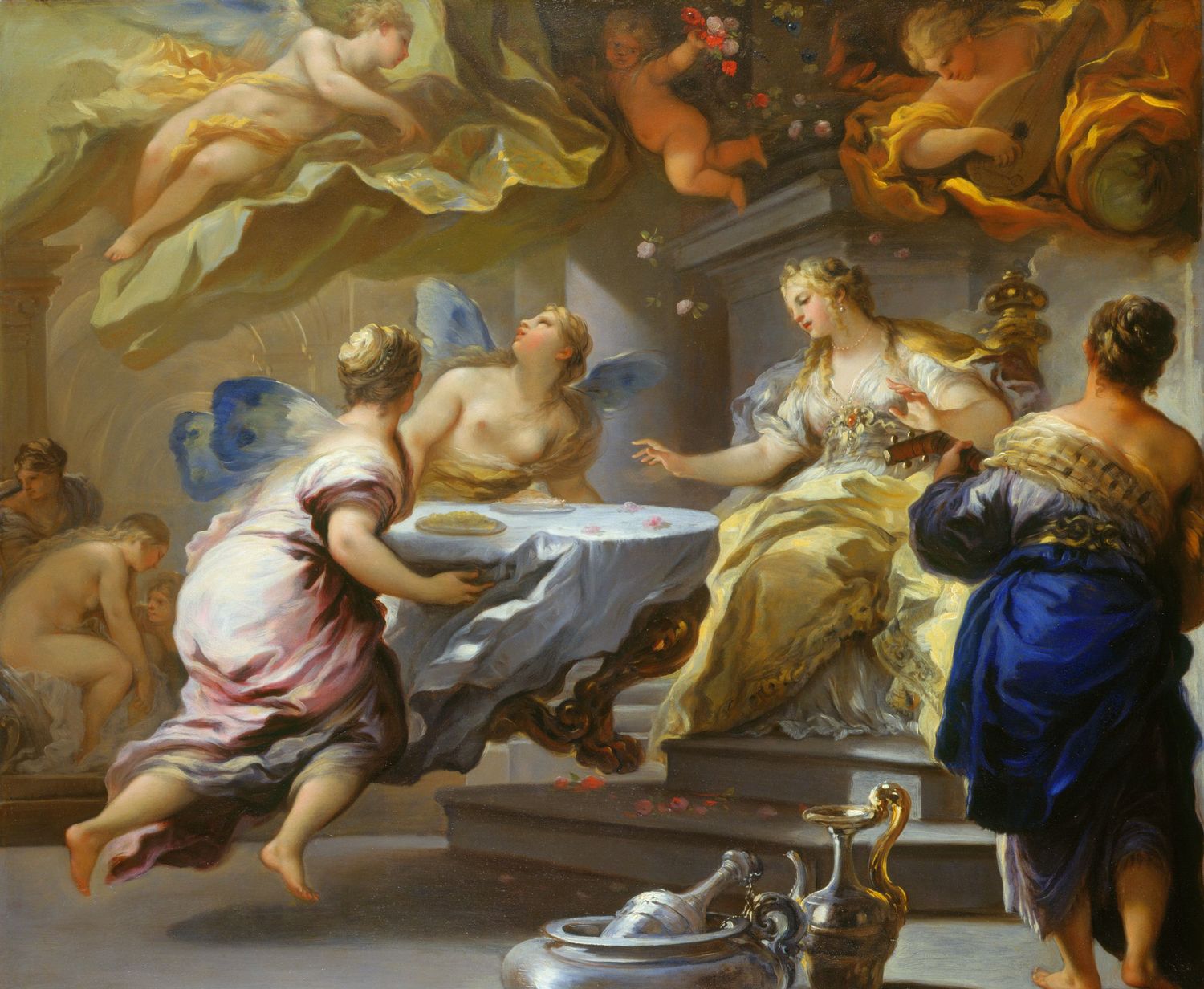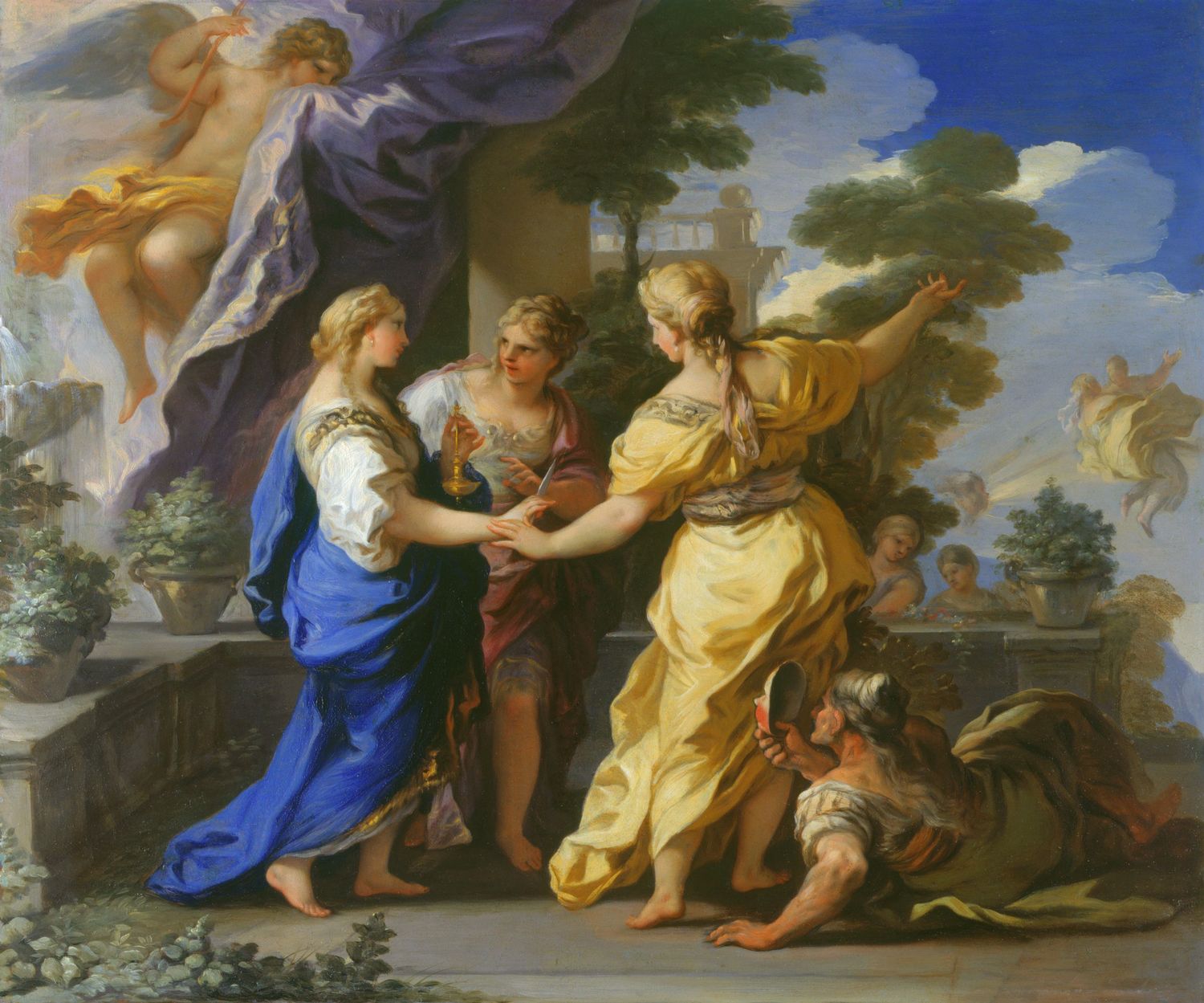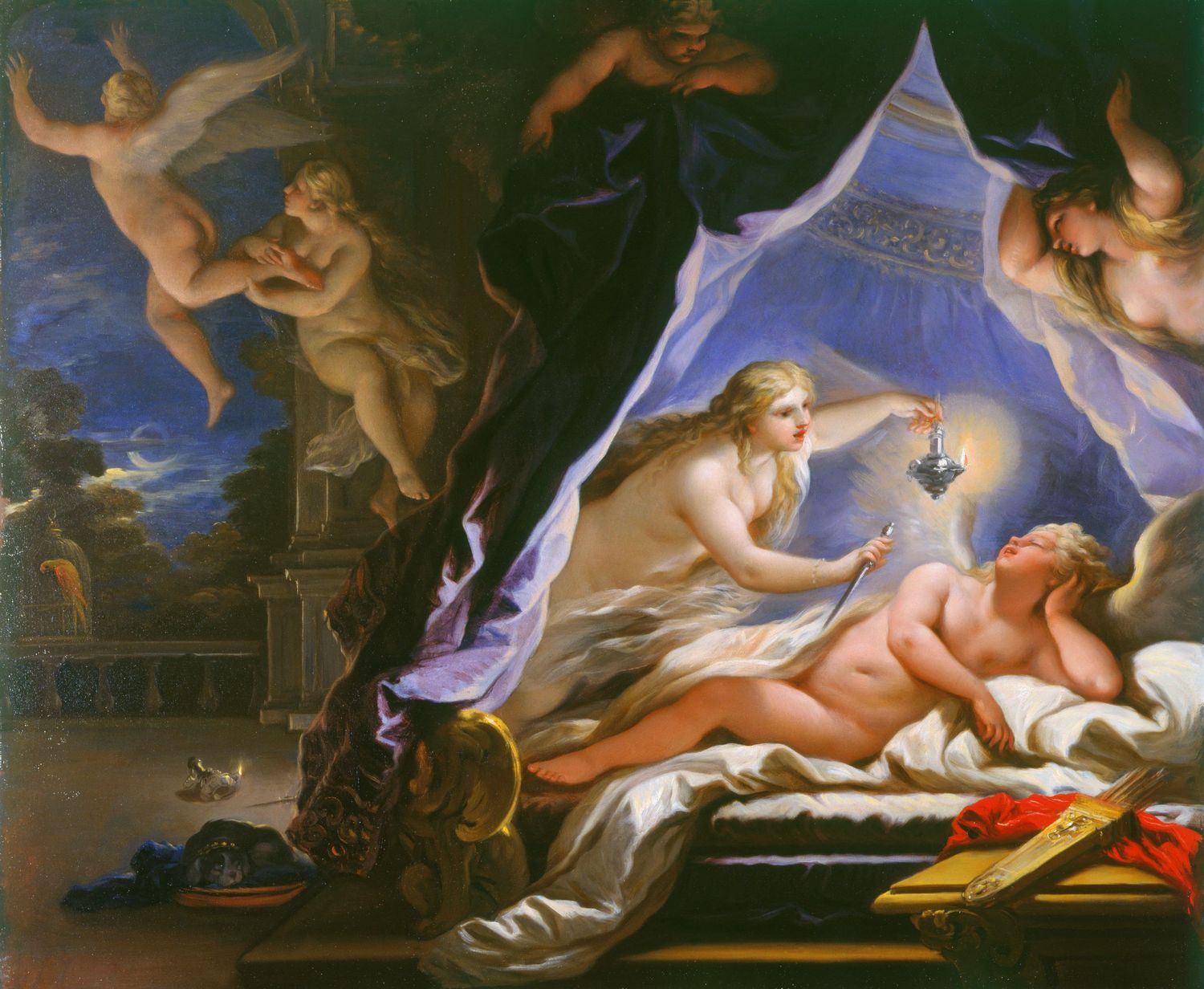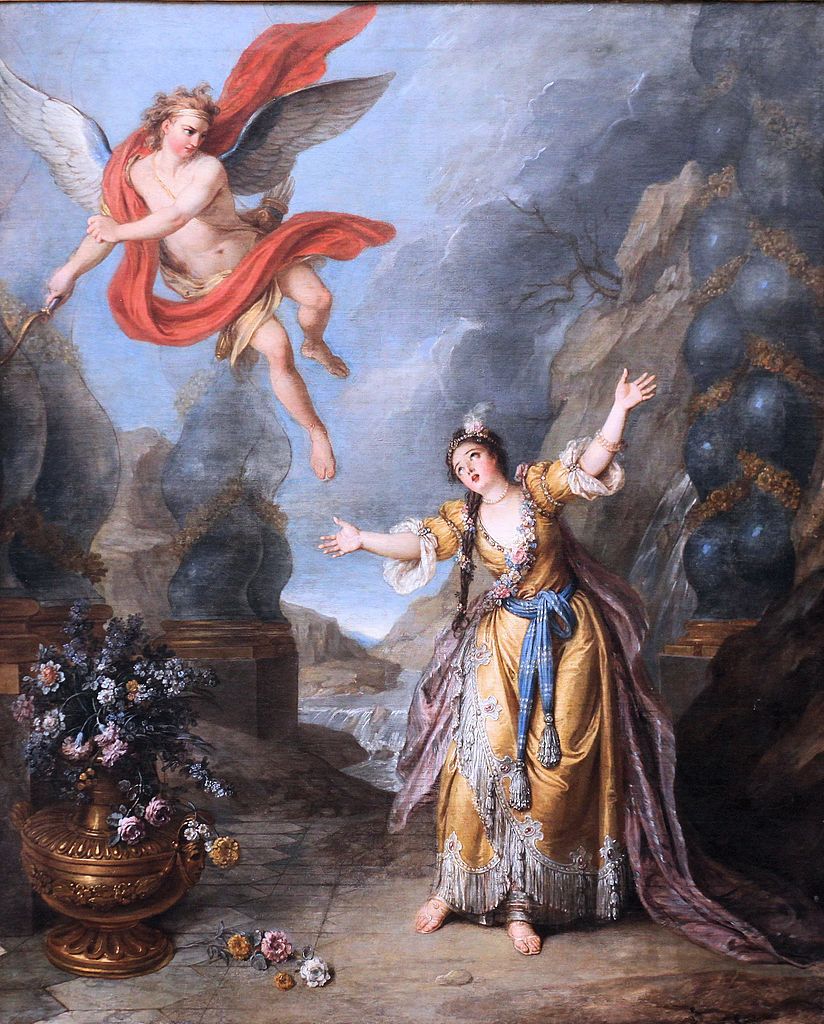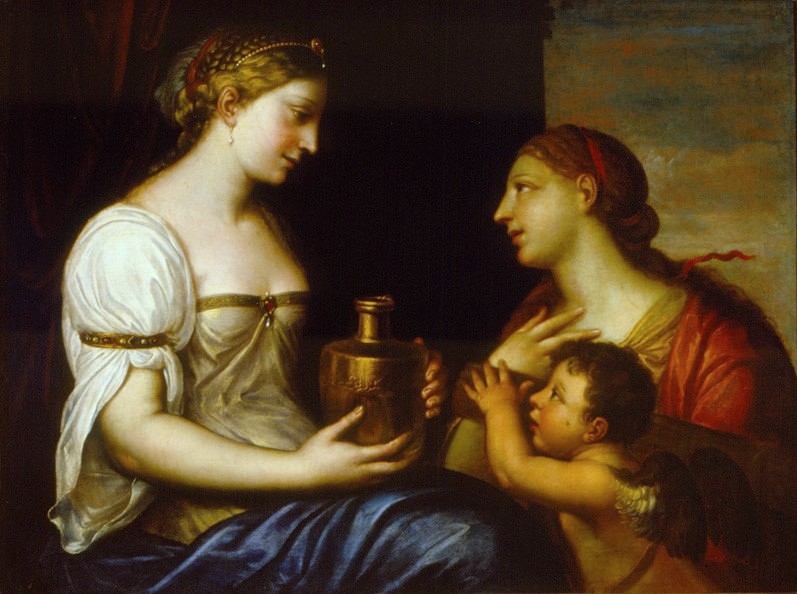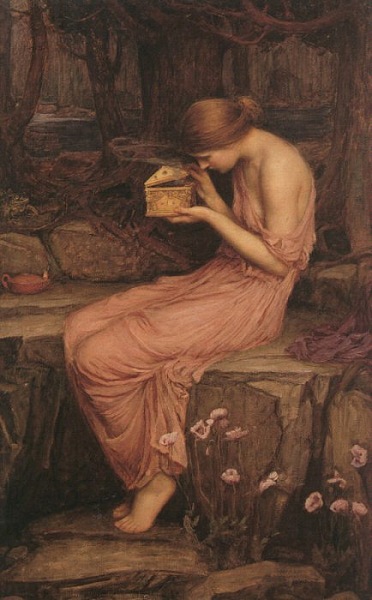6.4: Story- Cupid and Psyche
- Page ID
- 47174
Cupid and Psyche
Adapted from The Age of Fable, or Stories of Gods and Heroes by Thomas Bulfinch, $\ccpd$
Once upon a time, a king and queen had three daughters. The charms of the two older sisters were more than common, but the beauty of the youngest was so wonderful that there are no words for it. The fame of her beauty was so great that strangers from neighboring countries came in crowds to enjoy the sight, and looked on her with amazement, paying her respect which is due only to Venus herself. In fact, Venus found her temples deserted while men turned their devotion to this young girl. As she walked along in the streets, the people sang her praises, and threw flower petals at her feet.
This attention given to a mortal gave great offense to the real Venus. “Am I then to be surpassed in my honors by a mortal girl? But she shall not so quietly steal my honors. I will give her a reason to beg for forgiveness.” Then she calls her winged son Cupid, mischievous enough in his own nature, and provokes him more with her complaints. She points out Psyche to him and says, “My dear son, punish that disrespectful beauty; give your mother a revenge as sweet as her injuries are great; make that haughty girl fall in love with some low, mean, unworthy being, so that she may live in shame.”
Cupid prepared to obey the commands of his mother, readying his arrows of love and then hastened to the room of Psyche, whom he found asleep. Though the sight of her almost moved him to pity, he touched her side with the point of his arrow. At the touch she awoke, and opened eyes upon Cupid (himself invisible), which surprised him so much that in his confusion he wounded himself with his own arrow.
Psyche, now frowned upon by Venus, received no benefit from all her charms. True, all eyes looked eagerly upon her, and every mouth spoke her praises; but neither king, royal youth, not anyone, presented himself to ask for her hand in marriage. Her two elder sisters of moderate charms had now long been married to two royal princes; but Psyche, in her lonely apartment, hated her solitude, sick of that beauty which, while it received a lot of attention, had failed to awaken love.
Her parents, afraid that they had inadvertently incurred the anger of the gods, consulted the oracle of Apollo, and received this answer: “The girl is destined to be the bride of no mortal lover. Her future husband anticipates her on the top of the mountain. He is a monster whom neither gods nor men can resist.”
The dreadful words of the oracle filled all the people with dismay, and her parents cried. But Psyche said, “Why, my dear parents, do you now cry for me? You should have grieved when the people showered me with undeserved honors, and with one voice called me a Venus. I now know that I am a victim to that name. I give up. Lead me to that rock to which my unhappy fate has destined me.” Accordingly, all things being prepared, the royal princess took her place in the procession, which more resembled a funeral more than a wedding, and with her parents climbed the mountain, on the summit of which they left her alone, and with sorrowful hearts returned home.
While Psyche stood on the edge of the mountain, shaking with fear and with eyes full of tears, the gentle wind Zephyr raised her from the earth and carried her with an easy motion into a flowery field. Somehow, she felt calm and she laid herself down on the grass to sleep.
When she woke up, refreshed with sleep, she looked around and noticed a bright forest of tall and stately trees. She entered it, and in the middle of it discovered a fountain, sending forth clear and crystal waters, and nearby, a magnificent palace which couldn’t be the work of mortal hands, but the happy haven of some god. Drawn by admiration and wonder, she approached the building and decided to enter.
Every object she met filled her with pleasure and amazement. Golden pillars supported the vaulted roof, and the walls were covered with carvings and paintings representing beasts of the hunt and rural scenes. Proceeding forward, she saw that other rooms were filled with all manner of treasures, and beautiful and precious productions of nature and art.
While her eyes were engaged with this wonderous scenery, a voice addressed her, though she saw no one, whispering these words, “My lady, all that you see is yours. We whose voices you hear are your servants and shall obey all your commands with our utmost care and diligence. Relax in your room and lay on your comfy bed. Dinner is waiting for you in the next room when it pleases you to take your seat there.”
Psyche listened to her vocal attendants, and after a nap seated herself in the dining room, where a table immediately presented itself, without any visible aid from waiters or servants, and covered with the greatest delicacies of food and the most delicious wines. Her ears too were filled with music from invisible performers; of whom one sang, another played on the lyre, and all closed in the wonderful harmony of a full chorus.
She had not yet seen her destined husband. He came only in the hours of darkness and fled before dawn, but his words were full of love, and inspired a similar passion in her. She often begged him to stay and let her see him, but he would not. On the contrary, he told her to make no attempt to see him, for he must, for the best of reasons, keep concealed.

“Why do you want to see me?” he said. “Do you have any doubt of my love? Do you have any wish unfulfilled? If you saw me, perhaps you would fear me, perhaps adore me, but all I ask of you is to love me. I would rather you would love me as an equal than adore me as a god.”
This reasoning somewhat quieted Psyche for a time, and while the novelty lasted she felt quite happy. But after some time, the thought of her parents, left in ignorance of her fate, and of her sisters, concerned her and made her begin to feel her palace was more like a wonderful prison. When her husband came one night, she told him her distress, and at last he unwillingly consented that her sisters should be brought to see her.
So, calling Zephyr, she told him with her husband’s commands, and he, promptly obedient, soon brought them across the mountain down to their sister’s valley. They embraced her, and she returned their hugs. “Come,” said Psyche, “come to my house and refresh yourselves with whatever your sister has to offer.”
Then taking their hands she led them into her golden palace, and had her numerous attendant voices take care of them and show them all her treasures. Seeing all of this caused the two sisters to be envious at seeing their young sister with such a wonderful life, so much exceeding their own. They asked her numerous questions, among others what sort of person her husband was. Psyche replied that he was a beautiful youth who generally spent the daytime hunting upon the mountains.
The sisters, not satisfied with this reply, soon made her confess that she had never seen him. Then they proceeded to fill her mind with dark suspicions. “Remember,” they said, “the oracle said you are destined to marry a tremendously horrible monster. The inhabitants of this valley say that your husband is a terrible and monstrous serpent, who fills you up with luscious food so that he can eat you. Take our advice. Keep with you a lamp and a sharp knife; hide them so that your husband may not discover them, and when he is sound asleep, get out of bed, bring your lamp and see for yourself whether what they say is true or not. If it is, cut off the monster’s head, and then you’ll be free.”
Psyche resisted these persuasions as much as she could, but they did not fail to have their effect on her mind, and when her sisters were gone, their words and her own curiosity were too strong for her to resist. So she prepared her lamp and a sharp knife and hid them out of sight of her husband. When he had fallen into asleep, she silently came up to him and uncovering her lamp saw not a hideous monster, but the most beautiful and charming of the gods, with his golden curls laying on his snowy neck and pink cheek, with two wings on his shoulders, whiter than snow, with shining feathers.
As she leaned the lamp over to have a better view of his face, a drop of burning oil fell on the shoulder of the god. Startled, he opened his eyes. Then, without saying a word, he spread his white wings and flew out of the window. Psyche, in vain trying to follow him, fell from the window to the ground.
Cupid, looking back as she lay in the dirt, stopped his flight for an instant and said, “Oh foolish Psyche, is this how you repay my love? After I disobeyed my mother’s commands and made you my wife, will you believe I’m a monster and cut off my head? But go; return to your sisters, whose advice you seem to prefer to mine. I inflict no other punishment on you than to leave you forever. Love cannot live without trust.” After saying this he fled away, leaving poor Psyche laying on the ground screaming and crying.
When she had recovered some degree of composure, she looked around her, but the palace and gardens had vanished, and she found herself in the open field not far from the city where her sisters lived. She ran to where they lived and told them the whole story of her misfortunes, at which, pretending to be upset, those spiteful creatures inwardly celebrated. “Now,” they said, “he will perhaps choose one of us.” With this idea, without saying a word of her intentions, each of them woke up early the next morning and climbed the mountain, and having reached the top, called upon Zephyr to receive her and take her to the golden palace; then leaping up, and not being taken by Zephyr, fell down the cliff and was dashed to pieces.
Psyche, meanwhile, wandered day and night, without food or sleep, in search of her husband. Casting her eyes on a lofty mountain having on its edge a magnificent temple, she sighed and said to herself, “Perhaps my love lives there,” and walked towards the place.
As soon as she entered she saw piles of corn, some in loose ears and some in bundles, with ears of barley mixed in. Scattered about were sickles and rakes and all the instruments of harvest, in disarray. Psyche decided to organize and tidy up the room, separating and sorting everything to its proper place, believing that she ought to clean the home of the gods. The holy Ceres, whose temple it was, noticed Psyche cleaning up and spoke to her, “Oh Psyche, truly worthy of our pity, though I cannot shield you from the frowns of Venus, I can teach you how best to alleviate her displeasure. Go, then, and voluntarily surrender yourself to your lady, and try by modesty to win her forgiveness, and perhaps her favor will restore you the husband you have lost.”
Psyche obeyed the commands of Ceres and took her way to the temple of Venus, trying to fortify her mind and contemplating what she should say to appease the angry goddess, feeling that the issue was doubtful and perhaps fatal.
The Trials of Psyche
Venus received her with an angry face. “Most ill-behaved of mortals,” said she, “do you at last remember that you must bow down to me? Or have you come to see your sick husband, injured from the wound given to him by his loving wife? You are so disliked and rude that the only way you can win back your lover must be by diligence. I will test how good of a wife you are.” Then she ordered Psyche to be led to the storehouse of her temple, where there was a great quantity of wheat, barley, millet, beans, and lentils prepared for food for her doves, and said, “Take and separate all these grains, putting all of the same kind in a sack by themselves, and see that you get it done before evening.” Then Venus departed and left her to her task.
But Psyche, in shock at the enormous work, sat stupid and silent, without moving a finger toward the pile. While she sat in despair, Cupid inspired a little ant, a native of the fields, to have sympathy for her. The leader of the anthill, followed by whole hosts of his six-legged friends, approached the pile, and with the utmost diligence taking grain by grain, they separated the pile, sorting each kind to its sack; and when it was all done, they vanished out of sight in a moment.
Venus at the approach of twilight returned from the banquet of the gods. Seeing the task done, she exclaimed, “This is no work of yours, but his!” She then threw Psyche a piece of black bread for her supper and went away. The next morning, Venus ordered Psyche to be called and said to her, “Do you see that field which stretches along the edge of the water? There you will find sheep feeding without a shepherd, with golden-shining fleece on their backs. Go and bring me back a sample of that precious wool gathered from every one of their fleece.”
Psyche obediently went to the riverside, prepared to do her best. But the river god inspired the reeds with harmonious sounds which seemed to say, “Oh poor girl, don’t try to cross this dangerous river, nor venture among the formidable rams on the other side, for as long as they are under the influence of the rising sun, they burn with a cruel rage to destroy mortals with their sharp horns and teeth. But when the dusky sun has driven the rams to the shade, and the sound of the calm river has lulled them to sleep, you may then cross safely, and you will find the woolly gold sticking to the bushes and the trunks of the trees.”
Thus the compassionate river god gave Psyche instructions how to accomplish her task, and by observing his directions she soon returned to Venus with her arms full of the golden fleece; but she still did not receive the approval of her unforgiving mother-in-law, who said, “I know very well it is not by your own doings that you have succeeded in this task, and I am not satisfied yet that you have any capacity to make yourself useful. But I have another task for you. Here, take this box and go to the Underworld and give this box to Proserpina and say, ’My lady Venus desires that you send her a little of your beauty, for by taking care of her sick son she has lost some of her own.’ Don’t take too long on your mission, for I must paint myself with it to appear at the meeting of the gods and goddesses this evening.”
Psyche was now concerned that her destruction was imminent, being forced to go with her own feet directly down to the Underworld. To make no delay of what was not to be avoided, she went to the top of a high tower to throw herself off, thus to find the shortest way to the Underworld below. But a voice from the tower said to her, “Why, poor unlucky girl, do you plan to put an end to your days in such a dreadful manner? What a coward, who has been helped every step of the way…” Then the voice told her how by a certain cave she might reach the kingdom of Pluto, and how to avoid all the dangers of the road, to pass by Cerberus, the three-headed dog, and Charon, the ferryman, to take her across the black river and bring her back again. But the voice added, “When Proserpina has given you the box filled with her beauty, never open or look into the box nor allow your curiosity to look into the treasure of the beauty of the goddesses.”
Psyche traveled safely to the kingdom of Pluto. She was admitted to the palace of Proserpina, and without accepting the delicious banquet that was offered her, she delivered her message from Venus. The requested box was given to Psyche, shut and filled with the precious commodity. Then she returned the way she came, and glad was she to come out once more into the light of day.
But having got so far successfully through her dangerous task, a longing desire seized her to examine the contents of the box. “What if,” said she, “I just take a little bit to put on my cheeks to appear more beautiful in the eyes of my beloved husband!” So she carefully opened the box, but found nothing there of any beauty at all, but an infernal and truly Stygian* sleep, which being set free from its prison, took possession of her, and she fell down in the middle of the road, a sleepy corpse without sense or motion.
But Cupid, now recovered from his wound, and not able longer to bear the absence of his beloved Psyche, slipping through the smallest crack of the window of his room which happened to be left open, flew to the spot where Psyche lay, and gathering up the sleep from her body closed it again in the box, and woke Psyche with a light touch of one of his arrows. “Again,” he said, “you almost died from the same curiosity. But you did complete the task imposed on you by my mother, and I will take care of the rest.”
Then Cupid, as swift as lightning penetrating the heights of heaven, presented himself before Jupiter with his request for help. Jupiter listened and then pleaded the cause of the lovers so strongly with Venus that he won her consent. Then he sent Mercury to bring Psyche up to the heavenly assembly, and when she arrived, handing her a cup of ambrosia, he said, “Drink this, Psyche, and be immortal; nor shall Cupid ever break away from the knot in which he is tied, but these wedding vows shall be perpetual.”
Thus Psyche became at last united to Cupid, and in due time they had a daughter born to them whose name was Pleasure.
Vocabulary from the Story
We get several words from this story. Find the definition of the words below. How do they relate to the characters in the story?
character from the story | vocabulary | definition |
Psyche | psyche | |
to psych (someone) out | ||
psycho- (prefix) | ||
psychotic | ||
psychedelic |
Comprehension Questions
Answer the questions according to the article. Paraphrase your answer.
- In the beginning of the story, why does Venus hate Psyche?
- How did Cupid fall in love with Psyche?
- What was the prophesy from the oracle for Psyche’s love life?
- Describe the place where the wind god Zephyr took her.
- What did Psyche’s fiancé look like?
- How did Psyche betray her fiancé, and why?
- Who was her fiancé?
- What happened to Psyche’s two sisters in the palace, and why?
- Why did Venus punish Psyche with a series of tasks?
- What are the three tasks Venus required of Psyche?
- What did Psyche do with the box of Proserpina (Persephone)?
- How does the story end?
Critical Thinking Questions
Answer the following questions. Compare your answers with a partner.
- For someone named “psyche”, what does this story say about the human mind?
- If Cupid represents “love”, and Psyche represents “the mind”, what is this story trying to say about human life?
- What is interesting about the name of their child?
- This story may have inspired another very famous story that became a Disney movie. What story is this?
Critical Thinking
What event from the story is happening in the following paintings? (The pictures are in order of the events in the story to help you.)
Did You Know?

Psyche is often seen with butterflies and butterfly wings.
“The word for butterfly in formal Greek is psyche, thought to be the soul of the dead. Ancient Greeks also named the butterfly scolex (“worm”), while the chrysalis – which is the next stage of metamorphosis from a caterpillar – was called nekydallon, meaning “the shell of the dead”. The metamorphosis of the butterfly inspired many to use butterflies as a symbol of the soul’s exit from the body. Thus, the myth of Psyche signifies soul and butterfly.”
CEFR Level: CEF Level C1
- Image credits: 1,2,3: by Luca Giordano, 1695-1697, $\ccpd$. 4: by Charles-Antoine Coypel, 1730, $\ccpd$. 5: by Alessandro Varotari, 17th Century, $\ccpd$. 6: by John William Waterhouse, 1903, $\ccpd$ ↵



